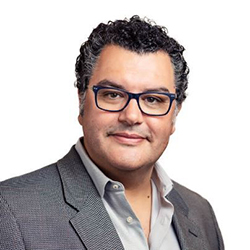James C. Houk Lecture in Motor Control: "Executing, Reinforcing and Refining Actions" with Rui Costa, DVM, PhD

When:
Thursday, May 2, 2024
2:00 PM - 3:30 PM CT
Where: Simpson Querrey Biomedical Research Center, Simpson-Querrey Auditorium, 303 E. Superior Street, Chicago, IL 60611 map it
Audience: Faculty/Staff - Student - Post Docs/Docs - Graduate Students
Contact:
Emily Larsen
(312) 503-1687
Emily.larsen@northwestern.edu
Group: Department of Neuroscience Seminars
Category: Lectures & Meetings, Academic
Description:
The Department of Neuroscience Presents:
The James C. Houk Lecture in Motor Control: "Executing, Reinforcing and Refining Actions"
Rui Costa, DVM, PhD
President and CEO
Allen Institute
Professor of Neuroscience
Columbia University
Abstract
The ability of animals to build individual repertoires based on the consequences of their actions is fascinating, and essential for survival. Understanding this process, i.e., how actions are learned through trial and feedback, requires mechanistic insight into how self-paced actions are initiated, how they can be selected/initiated again, and how feedback can refine their execution and organization. We use behavioral, genetic, electrophysiological, and optical approaches to gain this mechanistic insight. The combination of these approaches allowed us to uncover that dopaminergic neurons are transiently active before self-paced movement initiation. This activity is not action-specific and modulates both the probability of initiation and the vigor of future movements, but does not affect ongoing movement. Dopamine is supposed to have opposite effects on downstream striatal direct and indirect pathways. Contrary to what is classically postulated, we found that both striatal direct and indirect pathways are active during movement initiation. The activity in both pathways is action-specific and has complementary but different roles in movement, which are enabled by specific basal ganglia output circuits. Input from cortex seems to be critical to organize striatal activity, and cortico-striatal plasticity is necessary to select, reinforce and refine the specific neural and behavioral patterns that lead to desirable outcomes. These data invite new models on the mechanisms underlying self-paced movement initiation, and motor dysfunction in Parkinson’s disease. They also suggest that cortico-basal ganglia circuits play a generic role in learning to reinforce and refine task-relevant neural activity and behavioral patterns.
About Dr. Costa
Rui Costa is a neuroscientist and the current president and CEO of the Allen Institute. His laboratory develops and uses genetic, electrophysiological, optical, and behavioral approaches to investigate how the brain adaptively controls behavior and internal organ function. He did his PhD studies with Dr. Alcino Silva at UCLA and postdoctoral work with Dr. Miguel Nicolelis at Duke University. He then became section chief at the National Institutes of Health, an investigator of the Champalimaud Neuroscience Program, and a professor at Columbia University. He was co-director of Champalimaud Research and director/CEO of the Zuckerman Mind Brain Behavior Institute at Columbia University. He received several awards, such as the Young Investigator Award from SFN, the Ariëns Kappers Medal from the Royal Netherlands Academy of Arts and Sciences, and the Mina Bissell Award, and was knighted Commander of the Order of Sant'Iago da Espada by the President of Portugal. He is an elected member of EMBO, and the National Academy of Medicine.
About the James C. Houk Lecture in Motor Control
In 2020, the late James C. Houk, PhD, and his wife Antoinette made a bequest to establish the Dr. James Houk Graduate Fellowship in Neuroscience. Their gift provides funding to outstanding graduate students studying neurophysiology at Northwestern and supports the annual James C. Houk Lecture in Motor Control, presented by a renowned motor neuroscientist.
About James C. Houk, PhD
Dr. James C. Houk originally studied electrical engineering before receiving his PhD in physiology at Harvard University. As an assistant professor at Harvard, he studied Golgi tendon organs, muscle spindles and developed control models of muscle activation through neuronal circuits in the spinal cord.
Later, as an associate professor at Johns Hopkins Medical School, Houk began work on the central nervous system in behaving monkeys, work he continued at Northwestern University, after being recruited in 1978 as chair of the Department of Physiology (now Neuroscience). During this time, Houk also built a world-renowned systems neuroscience group within the department.
In 2001, after 23 years, Houk stepped down as chair to concentrate on multimodal approaches to studying how the nonlinear dynamics of microscopic modules in the brain give rise to its unique computational properties. He became particularly interested in the interplay between the basal ganglia, motor cortex and cerebellum.